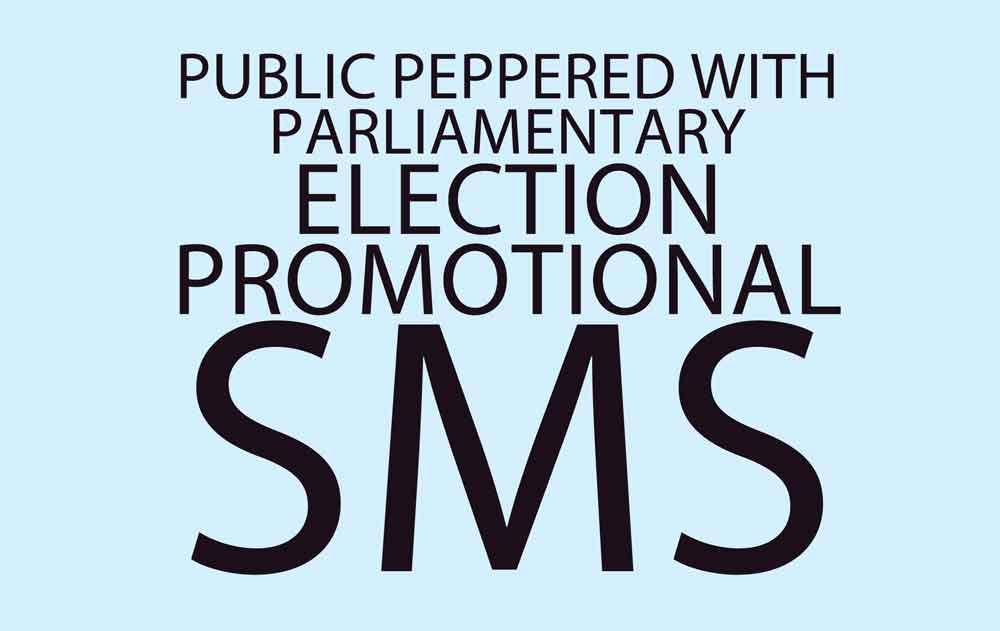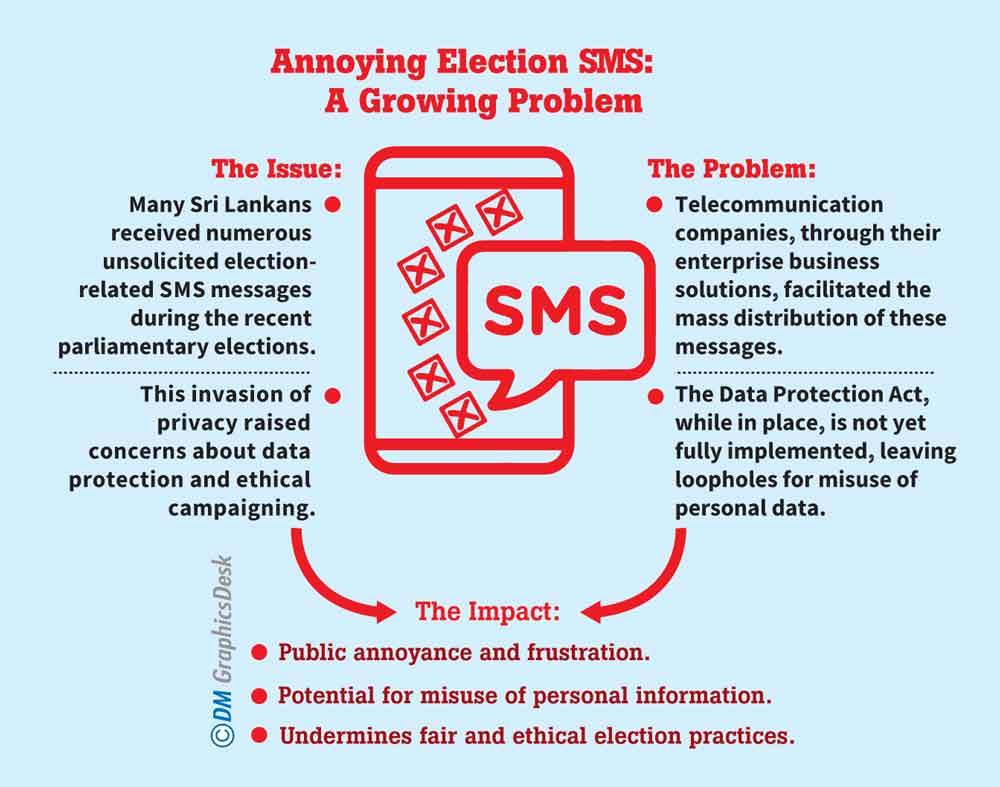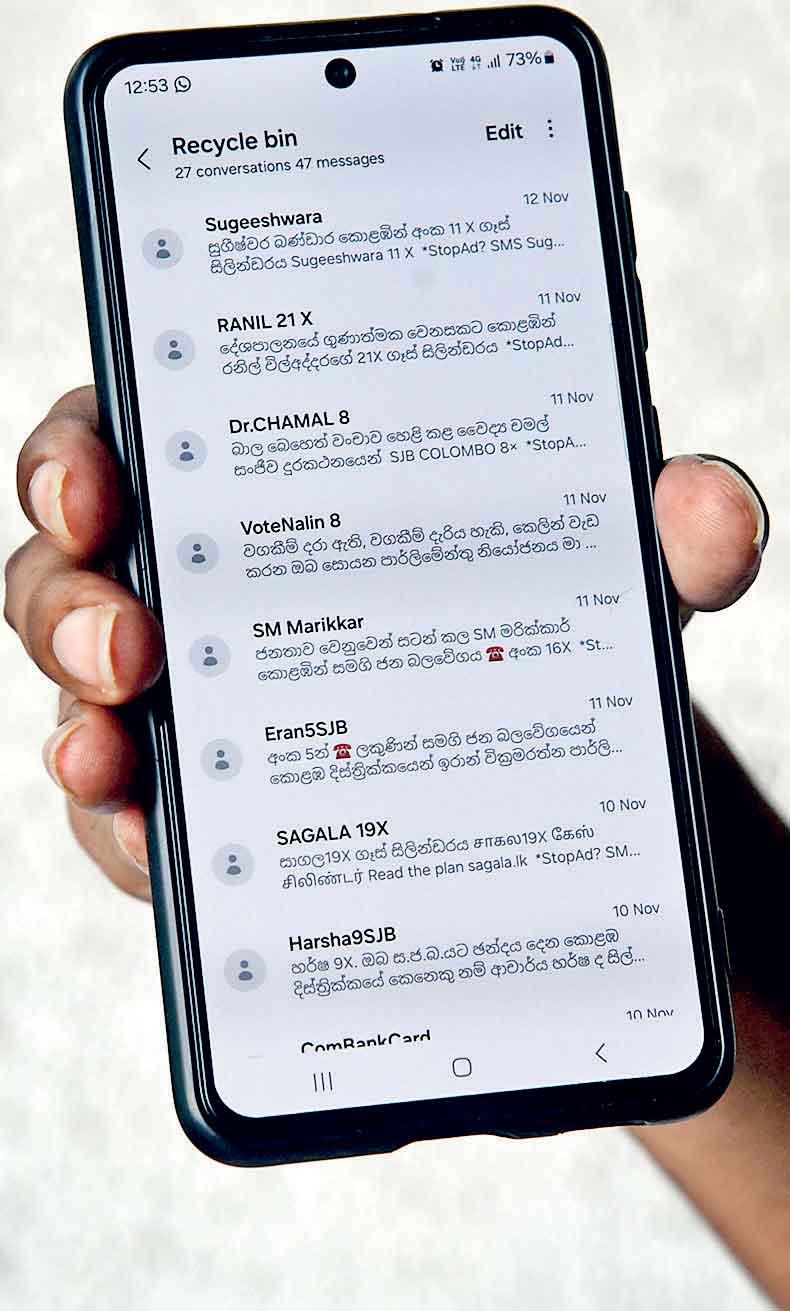21 Nov 2024 - {{hitsCtrl.values.hits}}


 Did you receive a vote-seeking SMS from a candidate in the run-up to the recently-concluded Parliamentary Elections? Subsequently, people possessing a franchise to vote were wondering how election campaigners trace and track an individual’s mobile phone number?
Did you receive a vote-seeking SMS from a candidate in the run-up to the recently-concluded Parliamentary Elections? Subsequently, people possessing a franchise to vote were wondering how election campaigners trace and track an individual’s mobile phone number?
Many people were inundated with these annoying election messages which they found to be a nuisance.
Prithvish Chandrasekeran, a freelance writer, received a series of messages and was forced to ponder on the question – ‘how am I getting these messages’?

Election propaganda sent via SMS to customers
A resident of Wellawatte, Chandrasekeran said,
 “Do they buy the contact-base of the public,” the 25-year-old questioned.
“Do they buy the contact-base of the public,” the 25-year-old questioned.
Despite the Data Protection Act (DPA) of No.9 of 2022, being enacted- based on DPA of Sri Lanka- various parties are evidently exploiting personal data for their own whims and fancies.
In fact, the DPA’s site adds that Sri Lanka made history as the first South Asian country to enact independent legislation.
However, though, Prof. Rohan Samarajiva, the founding Chair of LIRNEasia, an ICT policy and regulation think-tank, simplified and left a solution saying, “simply block the number with the technology on offer”.
“My general philosophy in this matter is, as long as they give me a blocking option, I would not get too excited”, Prof. Samarajiva, also a former Director General of Telecommunications, quipped.
“If your blocking option is not working, had I been in the regulatory commission, I would then get that activated. Because that is sort of simpler than other things. There was a limit on the blocks of SMS; around 250 I guess,” he said.
Prof. Samarajiva disclosing a significant fact, revealed, “Had we been having this conversation after 2025, I would say this is in violation of a particular section in the DPA Law. But we’re having this conversation in 2024. Therefore, it’s not a violation of the DPA, which has not been activated”.
CONSENT
So, the DPA has got a section which specifies that you cannot use people’s telephone numbers without their consent. But that act is not activated. It would be in force only in April 2025, he reiterated.
Responding to the Daily Mirror on how they obtain mobile phone numbers, a media spokesman for a leading telecommunications service provider, explained that it’s through the area’s coverage tower that the numbers are obtained. “For instance, if it’s Kurunegala, we have to get the SMS’s or numbers of Kurunegala from that area’s tower. For each area or region, there are various towers. Candidates get in touch with the Enterprise Business Promotion. We have solutions for bulk SMSs.
“We’ve some regional towers. Based on the requirement, numbers are obtained from those only. These are not from the marketing, instead Enterprise Business promotion. Actually, whatever the numbers, we have to get it from the particular tower”, he explained.
Dialog Axiata PLC, responding to queries on obtaining mobile phone numbers of customers, had this to say through a statement, “Dialog Axiata PLC is in full compliance with prevailing TRCSL regulations pertaining to the generation of promotional messages by external parties. As required by the TRCSL, any external party engaged in the dissemination of promotional messages should confirm that all messages transmitted are with the consent of the relevant subscribers registered with the external party. If you have not given explicit consent to receive these messages, please use the opt-out option, which is mandatorily inserted at the end of each SMS, to prevent further contact. Kindly note that the opt-out option is provided free of charge”.
Dialog Axiata PLC, however, declined to answer further questions on this subject.
Dr. Sunil Abeyratne, the Chair for Technology and Data Protection Committee, LAWASIA, said setting this process and getting it up-and-running is still in the transition process.
“At the moment, we have this Personal Data Protection Act being passed. But the issue here is, the commission has not yet been set up. This is the one issue that, Data Protection Act of No.9 of 2022 will be fully-operational from next year. New commissioners must come in. These are the practical issues now.
“We’re going through this transition period. They somehow get data into their hands. They advertise for this purpose. It has become a big nuisance to the public. If the Data Protection Act is in force, there would have been solutions for it,” said Dr. Abeyratne.
People from various parts of the island have been victims of these improperly planned election promotions. One such victim is Aadhil Siddhique, 26, a resident from Kalutara.
Starting from last week (Nov 4 onwards), Siddhique said that it was purely annoyed to receive 15 such SMSs.
“Honestly, it doesn’t make any change for me; getting these messages just made me annoyed. The biggest problem is, it’s not only from people contesting in my district Kalutara. I’m getting SMSs from Colombo and Gampaha district candidates, so what’s the point is such messages targeting me? I’m a Kalutara resident. I cannot vote for them, even if I want to. Such an annoyance, eventually,” Siddique vented out his frustration.
Remaining clueless, he went on, “I’ve no idea how they have obtained my number. I think we usually use mobile phone numbers when we go to supermarkets, register with loyalties, etc. Maybe that same database is being shared with these campaigns. Probably that’s one way. As I said, people contesting from other districts sending messages is the funniest part”.
Dr. Abeyrathne shared the same sentiments highlighted above by Prof. Samarajiva. “The issue here is that Personal Data Protection is not in operation. We need to find out whether these offenses come under the offences specified under the Online Safety Act or Computer Crime Act. That would be the solution for now.
“But after they fully operate the Data Protection Act, there is a special mechanism in there,” he said optimistically.
Prof, Samarajiva added that even if it’s a WhatsApp message, there still is a blocking option and that it has got nothing to do with the phone company.
“If I don’t want to deal with a certain person, I can block or cut the call. Why do we need to get the government involved in everything, when we have technology? We have laws and actual sections in the telecommunications act. The penalty has been increased for repeatedly calling somebody,” Prof, Samarajiva explained.
In the congested concrete jungle of Colombo, hailing from the Northern part of it, Elmo Leon, had been receiving such SMSs for a fortnight.
Leon, a digital Marketing Analyst, called it unnecessary and opined that it doesn’t make much of an impact.
Getting bombarded by these messages as a Bambalapitiya resident, *Sivathasan found it intimidating and annoying to see these messages reaching him via SMS and WhatsApp.
Sharing the same sentiment was *Maathumai, a Business Analyst professional, who was quite irritated by all such election propaganda.
“Clearly a direct marketing way to get your way through to your target audience. Quite annoying. My inbox is filled with these messages,” said Maathumai.
Prof. Samarajiva added, “It is only in the old days-with fixed phones (old styled-land lines) telephones made any sense. When I was Director General of Telecom, the world was full of fixed telephones, so then you don’t know who on earth is calling you. Whether known, unknown or private, we don’t know”.
“We’re no longer living in that world. We’re living in a different world,” said Prof. Samarajiva.
*(Surnames withheld to protect identity)
25 Dec 2024 18 minute ago
24 Dec 2024 9 hours ago
24 Dec 2024 24 Dec 2024
24 Dec 2024 24 Dec 2024
24 Dec 2024 24 Dec 2024